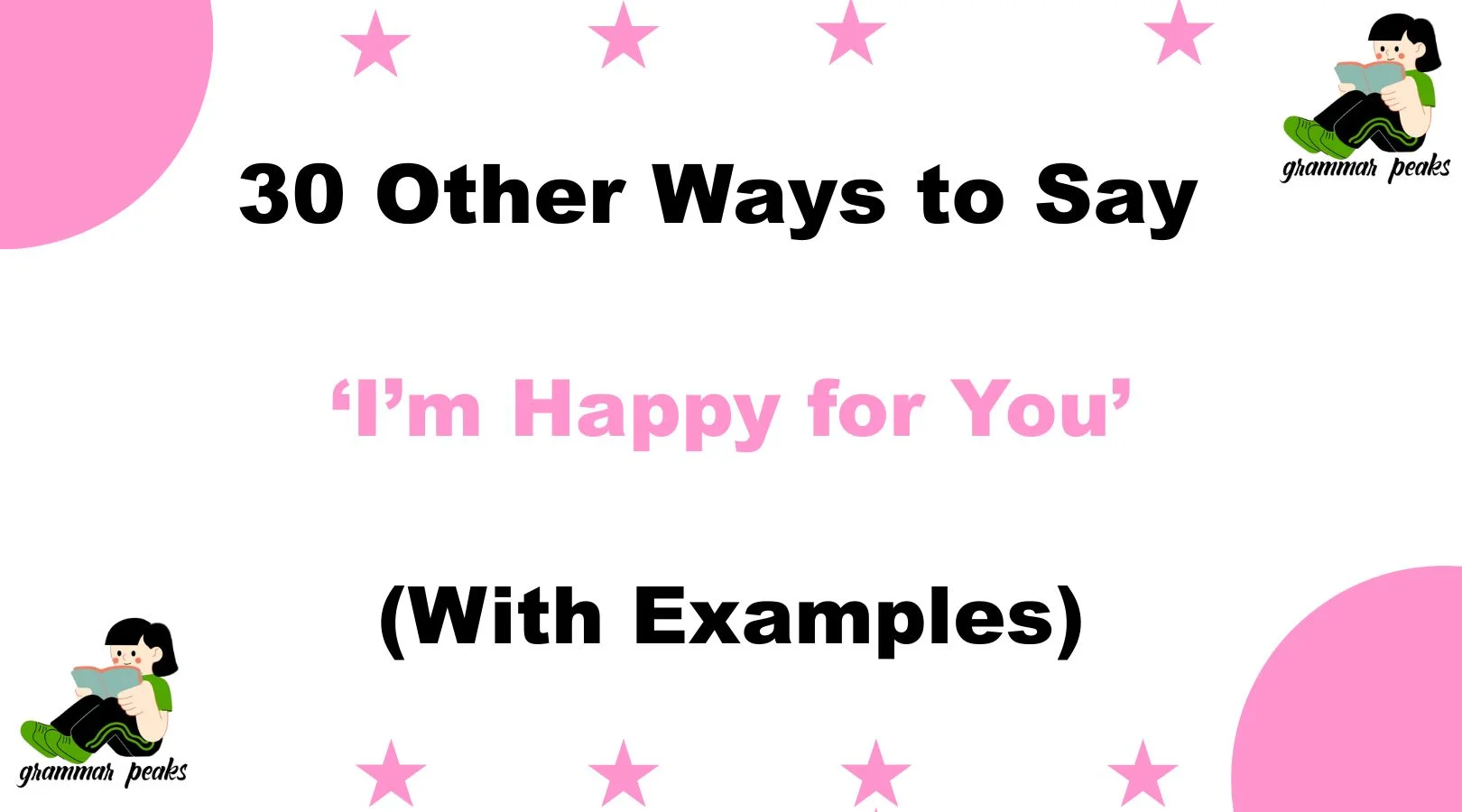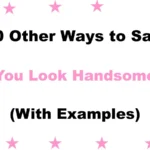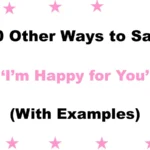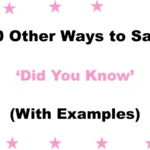Expressing genuine happiness for someone else’s success or joy is a beautiful way to show you care. However, sometimes the phrase “I’m happy for you” can feel too simple or repetitive. Finding the right words to share your feelings thoughtfully can deepen your connection and make your message feel more personal and heartfelt.
Whether you’re congratulating a friend, celebrating a colleague’s achievement, or supporting a family member, these 30 alternative expressions will help you communicate your joy with warmth, sincerity, and nuance. Each phrase comes with explanations and examples so you can choose the perfect way to say it in any situation.
What Does “I’m Happy for You” Mean?
The phrase “I’m happy for you” expresses a feeling of joy or pleasure for another person’s good fortune, achievement, or positive experience. It shows empathy and support, reflecting that you share in their happiness without jealousy or envy. This simple statement fosters connection and positivist in personal and professional relationships.
When to Use “I’m Happy for You”
Use “I’m happy for you” when someone you care about shares good news, such as a promotion, engagement, accomplishment, or any positive change. It’s appropriate in both informal and formal settings where you want to express sincere goodwill and encouragement.
Is It Professional/Polite to Say “I’m Happy for You”?
Yes, “I’m happy for you” is polite and professional when used sincerely. In workplaces, it helps build positive morale and relationships. However, in professional emails or formal occasions, you might want to use a slightly more polished alternative to maintain tone and respect.
Pros and Cons
Pros:
- Simple and clear
- Universally understood
- Conveys genuine empathy
Cons:
- Can feel repetitive or generic
- May lack emotional depth in certain contexts
- Might sound less enthusiastic in written form
Synonyms for “I’m Happy for You”
- I’m thrilled for you
- Congratulations on your success
- That’s wonderful news!
- I’m so pleased for you
- You deserve this happiness
- I’m overjoyed by your achievement
- Cheers to your accomplishment
- I’m genuinely delighted for you
- So happy to hear your good news
- You’ve earned this moment
- I’m proud of you
- That’s fantastic to hear
- I’m excited for your journey ahead
- Wishing you all the best
- I’m glad things are going well for you
- You must be so proud
- It’s great to see you succeed
- I’m happy to celebrate this with you
- Your happiness means a lot to me
- Here’s to your bright future
- I’m so glad for you
- What wonderful progress!
- So pleased to see your hard work pay off
- I’m joyful to hear this
- You’ve worked so hard for this
- This is such great news!
- I’m truly happy for your success
- You’ve made me happy with this news
- I’m sending you my warmest congratulations
- I’m delighted by your good fortune
1. I’m thrilled for you
Definition: An enthusiastic expression of happiness for someone’s success.
Detailed Explanation: This phrase communicates strong excitement and joy. It is ideal when you want to show that you are genuinely moved by the good news.
Scenario Example: “I’m thrilled for you on landing that new job!”
Best Use: Close friends, family, and colleagues you know well.
Worst Use: May be too informal or intense for formal professional settings.
Tone: Enthusiastic, warm, energetic.
2. Congratulations on your success
Definition: A formal way to acknowledge someone’s achievement.
Detailed Explanation: This phrase is respectful and polished, appropriate for professional and social contexts where you want to recognize accomplishments sincerely.
Scenario Example: “Congratulations on your success in the recent project.”
Best Use: Workplaces, academic achievements, or formal occasions.
Worst Use: May sound impersonal if used without warmth in personal conversations.
Tone: Respectful, formal, sincere.
3. That’s wonderful news!
Definition: A joyful reaction to hearing good news.
Detailed Explanation: This phrase highlights your positive response to the information someone shares, signaling support and happiness.
Scenario Example: “That’s wonderful news about your promotion!”
Best Use: Casual or professional messages where enthusiasm is welcome.
Worst Use: Too vague if used repeatedly or without further context.
Tone: Friendly, upbeat, supportive.
4. I’m so pleased for you
Definition: A polite and sincere way to express happiness for someone.
Detailed Explanation: This phrase conveys heartfelt satisfaction with the other person’s happiness or success.
Scenario Example: “I’m so pleased for you and your new home.”
Best Use: Both personal and professional contexts where you want to be courteous.
Worst Use: Might sound less energetic in very casual conversations.
Tone: Polite, warm, considerate.
5. You deserve this happiness
Definition: A compassionate expression affirming the person’s worthiness of their success or joy.
Detailed Explanation: This phrase emphasizes that the happiness or achievement is well-earned, showing deep appreciation for their efforts.
Scenario Example: “After all your hard work, you deserve this happiness.”
Best Use: Close relationships and when you know the person’s struggles.
Worst Use: Could sound presumptive if you don’t know their journey well.
Tone: Supportive, empathetic, encouraging.
6. I’m overjoyed by your achievement
Definition: A strong emotional response expressing great happiness.
Detailed Explanation: This phrase communicates a joyful reaction that is heartfelt and intense.
Scenario Example: “I’m overjoyed by your achievement; you truly earned it!”
Best Use: Close friends and family during major milestones.
Worst Use: Too intense for casual or formal settings.
Tone: Passionate, warm, celebratory.
7. Cheers to your accomplishment
Definition: A casual, celebratory phrase expressing good wishes.
Detailed Explanation: Often used to toast someone’s success, this phrase adds a playful and social touch to your congratulations.
Scenario Example: “Cheers to your accomplishment—here’s to many more!”
Best Use: Informal settings, gatherings, or social media.
Worst Use: Not appropriate in formal communication.
Tone: Fun, lively, supportive.
8. I’m genuinely delighted for you
Definition: A sincere expression of happiness.
Detailed Explanation: This phrase emphasizes authenticity and heartfelt emotion without being overly casual.
Scenario Example: “I’m genuinely delighted for you on this new chapter.”
Best Use: Semi-formal or personal notes where sincerity matters.
Worst Use: Can sound formal if overused in very casual chats.
Tone: Sincere, warm, balanced.
9. So happy to hear your good news
Definition: A friendly and supportive phrase upon learning of positive events.
Detailed Explanation: This expression conveys your pleasure in hearing the other person’s positive updates.
Scenario Example: “So happy to hear your good news about the promotion!”
Best Use: Everyday conversations, emails, and texts.
Worst Use: May feel generic if used repeatedly.
Tone: Friendly, warm, informal.
10. You’ve earned this moment
Definition: A phrase acknowledging effort and rewarding success.
Detailed Explanation: This highlights the deserved nature of the achievement and the importance of savoring it.
Scenario Example: “You’ve earned this moment after all the dedication you’ve shown.”
Best Use: When recognizing long-term effort and perseverance.
Worst Use: Could sound patronizing if context isn’t known.
Tone: Encouraging, respectful, heartfelt.
11. I’m proud of you
Definition: A statement of admiration for someone’s achievement or growth.
Detailed Explanation: This phrase is often used in close relationships where you’ve witnessed someone’s journey or personal development.
Scenario Example: “I’m proud of you for chasing your dreams and making them real.”
Best Use: Perfect for family members, close friends, mentors, or students.
Worst Use: May sound overly intimate or parental in formal settings.
Tone: Encouraging, emotional, affirming.
12. That’s fantastic to hear
Definition: A positive and enthusiastic reaction to someone’s good news.
Detailed Explanation: This expression is flexible and shows genuine interest and excitement, while keeping a casual tone.
Scenario Example: “That’s fantastic to hear—congratulations on the new role!”
Best Use: Great for both casual and professional settings.
Worst Use: Might seem generic if not followed by a more personal note.
Tone: Friendly, energetic, polite.
13. I’m excited for your journey ahead
Definition: A forward-looking phrase expressing support for someone’s future.
Detailed Explanation: This phrase is forward-thinking and optimistic, perfect when someone is beginning a new chapter.
Scenario Example: “I’m excited for your journey ahead—can’t wait to see what’s next!”
Best Use: Graduation, new jobs, moving, or personal transformation.
Worst Use: Less relevant for small or one-time achievements.
Tone: Hopeful, supportive, future-focused.
14. Wishing you all the best
Definition: A polite, versatile way to express goodwill and happiness.
Detailed Explanation: This neutral phrase works in many scenarios, offering kind wishes without sounding overly emotional.
Scenario Example: “Wishing you all the best in your new venture!”
Best Use: Emails, formal cards, or professional goodbyes.
Worst Use: Can seem too general if not paired with context.
Tone: Courteous, flexible, well-mannered.
15. I’m glad things are going well for you
Definition: A calm and sincere recognition of someone’s positive situation.
Detailed Explanation: This phrase expresses genuine contentment for someone else without overwhelming emotion.
Scenario Example: “I’m really glad things are going well for you lately—you deserve it.”
Best Use: Long-term friends, acquaintances, coworkers.
Worst Use: Might sound passive if not delivered with warmth.
Tone: Low-key, friendly, affirming.
16. You must be so proud
Definition: An empathetic phrase that reflects back the person’s sense of achievement.
Detailed Explanation: This phrase puts the focus on the recipient, showing that you understand their happiness.
Scenario Example: “Wow, you must be so proud of everything you’ve accomplished!”
Best Use: Parents, graduates, award-winners.
Worst Use: May sound assumptive if you’re unsure of their feelings.
Tone: Supportive, empathetic, appreciative.
17. It’s great to see you succeed
Definition: A positive acknowledgment of visible progress or achievement.
Detailed Explanation: This is especially effective when you’ve witnessed someone’s efforts and now see the results.
Scenario Example: “It’s great to see you succeed after everything you’ve put into this.”
Best Use: Colleagues, classmates, peers.
Worst Use: Too generic if you haven’t been part of their journey.
Tone: Encouraging, friendly, observant.
18. I’m happy to celebrate this with you
Definition: A heartfelt statement showing your willingness to join in someone’s joy.
Detailed Explanation: This phrase emphasizes togetherness and emotional support, making it more personal than standard congratulations.
Scenario Example: “I’m happy to celebrate this with you—what a moment!”
Best Use: Parties, gatherings, milestones.
Worst Use: Less suitable for professional emails or formal tone.
Tone: Intimate, supportive, celebratory.
19. Your happiness means a lot to me
Definition: A deeply personal way of showing how much you care.
Detailed Explanation: This goes beyond congratulating and expresses that their joy directly impacts your own.
Scenario Example: “Your happiness means a lot to me. Seeing you smile makes my day.”
Best Use: Romantic relationships, close friendships.
Worst Use: Too personal for work or casual acquaintances.
Tone: Intimate, warm, emotional.
20. Here’s to your bright future
Definition: A forward-facing toast to continued success and happiness.
Detailed Explanation: This phrase is optimistic and inspirational, great for encouraging someone entering a new phase.
Scenario Example: “Here’s to your bright future—cheers to everything that’s ahead!”
Best Use: Toasts, speeches, graduation messages.
Worst Use: Less relevant for small achievements.
Tone: Hopeful, celebratory, inspiring.
21. I’m so glad for you
Definition: A gentle and caring way to express shared happiness.
Detailed Explanation: This version feels more emotionally present than the basic “I’m happy for you.”
Scenario Example: “I’m so glad for you—this opportunity sounds perfect.”
Best Use: All personal messages, especially heartfelt ones.
Worst Use: Might seem vague in emails without context.
Tone: Kind, warm, soft.
22. What wonderful progress!
Definition: Recognition of someone’s growth or improvement.
Detailed Explanation: This phrase celebrates effort and evolution, not just the end result.
Scenario Example: “What wonderful progress you’ve made—keep going!”
Best Use: Long-term projects, self-improvement journeys.
Worst Use: Not suited for one-time accomplishments.
Tone: Encouraging, observant, thoughtful.
23. So pleased to see your hard work pay off
Definition: A supportive message acknowledging effort behind the achievement.
Detailed Explanation: This conveys deep respect for persistence, not just results.
Scenario Example: “So pleased to see your hard work pay off—you’ve earned every bit of this.”
Best Use: Academic, work, or personal goals achieved over time.
Worst Use: Not relevant for lucky or unexpected wins.
Tone: Respectful, appreciative, grounded.
24. I’m joyful to hear this
Definition: A slightly more formal, elegant way to share happiness.
Detailed Explanation: It sounds graceful and composed, suitable for written or spoken messages with a touch of refinement.
Scenario Example: “I’m joyful to hear this success has come your way.”
Best Use: Cards, thank-you notes, spiritual or formal circles.
Worst Use: Too poetic for casual conversations.
Tone: Elegant, heartfelt, graceful.
25. You’ve worked so hard for this
Definition: A supportive reminder of the person’s dedication.
Detailed Explanation: Emphasizing effort and sacrifice, this message shows deep validation.
Scenario Example: “You’ve worked so hard for this—enjoy every second!”
Best Use: Career, school, and fitness-related goals.
Worst Use: Not appropriate if you don’t know their journey.
Tone: Affirming, proud, empowering.
26. This is such great news!
Definition: An enthusiastic, spontaneous reaction to positive news.
Detailed Explanation: This is ideal for messages where you want to show immediate and unfiltered excitement.
Scenario Example: “This is such great news! So thrilled for you!”
Best Use: Texts, social media, upbeat conversations.
Worst Use: Too casual for formal contexts.
Tone: Excited, cheerful, casual.
27. I’m truly happy for your success
Definition: A sincere and slightly formal version of the original phrase.
Detailed Explanation: This version adds depth and authenticity, especially in writing.
Scenario Example: “I’m truly happy for your success—it’s well deserved.”
Best Use: Professional letters, heartfelt messages.
Worst Use: May sound too serious for very light moments.
Tone: Professional, warm, dignified.
28. You’ve made me happy with this news
Definition: A phrase showing shared joy and emotional connection.
Detailed Explanation: This message reflects that their good news lifts your mood, which is very supportive.
Scenario Example: “You’ve made me happy with this news—thank you for sharing it!”
Best Use: Friends, loved ones, positive inner circles.
Worst Use: Too emotional for workplace use.
Tone: Intimate, affirming, caring.
29. I’m sending you my warmest congratulations
Definition: A formal and kind way to express heartfelt support.
Detailed Explanation: This is best when you need to show professionalism and respect, while still being warm.
Scenario Example: “I’m sending you my warmest congratulations on the award.”
Best Use: Business letters, job promotions, formal events.
Worst Use: May feel too formal in close friendships.
Tone: Formal, polished, thoughtful.
30. I’m delighted by your good fortune
Definition: A more refined phrase that acknowledges someone’s luck or success.
Detailed Explanation: This is ideal for unexpected wins or life’s blessings, rather than effort-based achievements.
Scenario Example: “I’m delighted by your good fortune—enjoy this new chapter!”
Best Use: Lottery wins, travel opportunities, surprise blessings.
Worst Use: Not ideal when hard work is the focus.
Tone: Refined, calm, positive.
Conclusion
Finding the right way to say “I’m happy for you” helps you build stronger, more authentic relationships. Whether you’re talking to a colleague, friend, or loved one, using the right words shows your genuine support, warmth, and emotional intelligence. By choosing alternatives that match the tone and context of the moment, you make your message more personal, thoughtful, and memorable. Let your words reflect your heart—and remember, sincerity always shines brighter than formality.
FAQs
1. Why should I use alternatives to “I’m happy for you”?
Using alternatives helps your message sound more personal, genuine, and tailored to the situation. While “I’m happy for you” is perfectly fine, variety in expression adds emotional depth and helps you connect better with the person you’re speaking to.
2. Are these alternatives appropriate for professional settings?
Yes, several phrases like “Congratulations on your success”, “Wishing you all the best”, and “I’m truly happy for your success” are perfect for professional environments. Just choose the tone and formality based on your relationship with the recipient.
3. What’s the difference between “I’m proud of you” and “I’m happy for you”?
“I’m proud of you” focuses more on the accomplishment and effort someone put in, often used when there’s a close relationship or mentorship. “I’m happy for you” emphasizes sharing in someone’s joy, regardless of the emotional closeness or the nature of the achievement.
4. How can I make my message feel more sincere?
Add a specific detail about why you’re happy for the person. For example, say:
“I’m thrilled for you on getting that scholarship—you worked so hard!”
Specific praise makes your message feel more heartfelt and genuine.
5. Can I use emojis or humor in these phrases?
Yes, in casual settings like texting or social media, adding a or can enhance warmth and enthusiasm. Phrases like “Have a blast celebrating!” or “Cheers to your awesome news!” can keep the tone fun and friendly, as long as it matches the context.

Mariah Cannon is a dedicated Senior Content Specialist at GrammarPeaks, known for her clear, engaging writing and deep knowledge of English grammar and usage. With a background in linguistics and years of experience in content development, Mariah crafts informative and accessible articles that empower readers to master the nuances of the English language. Her work reflects a commitment to clarity, education, and helping others express themselves with confidence.





